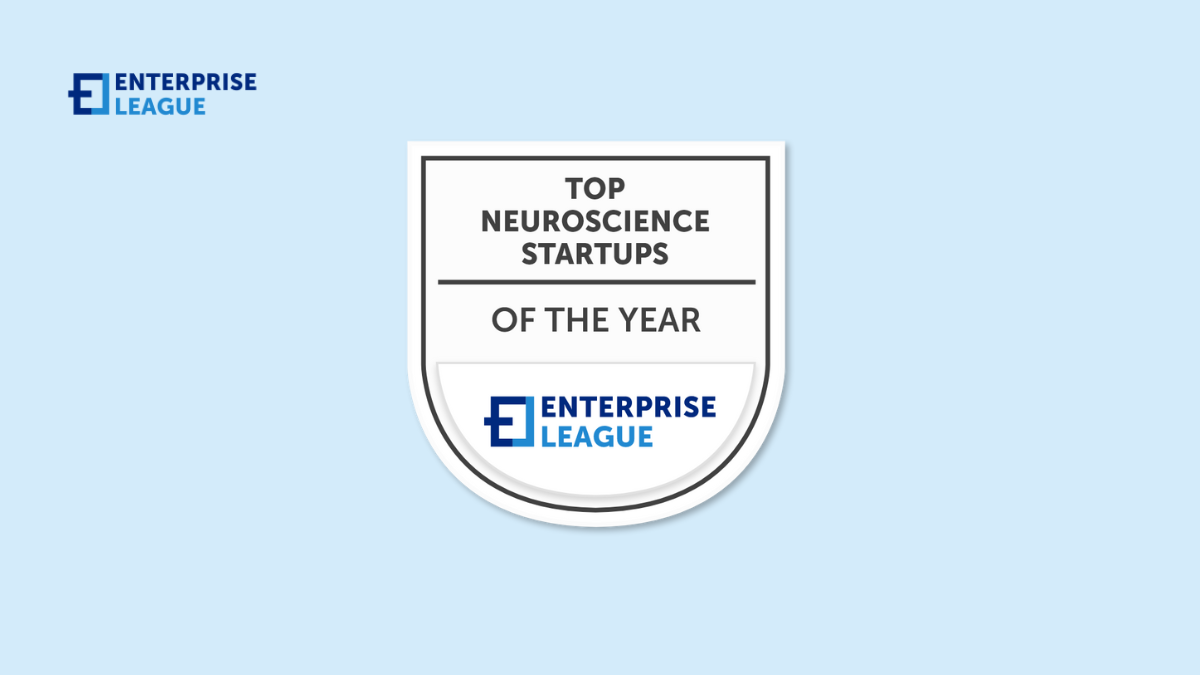As neuroscience is becoming a more mainstream-friendly subject, neuroscience startups are working hard to bring solutions that utilize this modern scientific field to help people improve their lives.
The Neuroscience market size was worth around US$ 31.80 billion in 2021 and is estimated to hit approximately US$ 39.09 billion by 2028.
What are neuroscience startups?
Earable
Founded in 2018, Earable has created a smart ear-worn device that can track important health data. It is designed to be worn comfortably inside the ear all day and night, continuously monitoring metrics like body temperature, heart rate, and breathing rate.
The motivation behind Earable was to have a less obtrusive wearable sensor that could catch emerging health issues early. By locating sensors in the ear, a very central point of the body, Earable can get accurate core readings of temperature, pulse rate, and respiration. Even small changes can signify oncoming illness, fatigue, stress, or fitness improvements.
Kernel
Kernel is pioneering safe, non-invasive methods to decode brain activity for advancing neuroscience discoveries and medical treatments. Bringing together experts across engineering, neuroscience, and physics, the company is developing innovative technologies to capture brain signals without surgery.
Kernel’s core offering, Kernel Flow, uses light-based sensors to measure blood flow dynamics related to neural activity at high speeds and resolution. By applying new sensing techniques for imaging brain function, Kernel aims to unlock capacities to diagnose disorders earlier and open new frontiers in therapies tailored to individual brains. With versatile, wearable scanning of neural signals, Kernel strives to make reading and responding to the brain’s shifting needs widely accessible to both researchers mapping cognition and doctors enhancing care.
AviadoBio
Founded in 2020, AviadoBio is pioneering precision gene therapies that target root causes of neuron death in the brain. Using AAV gene delivery, their treatments aim to rescue function, restore lost connections, and regenerate dying cells.
Initial programs show promise in reversing motor and cognitive decline in preclinical models. AviadoBio’s viral vector and delivery platform enables therapies to cross the blood-brain barrier at scale.
Flow Neuroscience
Flow Neuroscience’s products enable research-backed brain stimulation treatments conveniently at home as part of an affordable subscription plan. Their goal is providing drug-free depression relief and tools for emotional wellbeing.
Verge Genomics
Verge Genomics uses computational approaches to uncover novel therapeutic targets and viable lead treatments for hitherto untreatable nervous system diseases. Their AI solutions enhance R&D capabilities.
BrainCo
By making therapeutic neurotechnology accessible, BrainCo aims to enhance cognitive capabilities and overall wellbeing. Their innovations blend ancient wisdom around mental states with modern biofeedback.
Brain.fm
Brain.fm aims to harness the brain’s neuroplasticity through engineered sound environments that entrain neural oscillations. Their technology leverages music’s effects on cognition and mood.
Neuralink
Potential applications include restoring motor function, treating neurological conditions, and merging artificial and human intelligence. Neuralink’s neurotechnology promises a future where disabilities are remedied and human potential is expanded.
Motorica
By closing the loop between intent and action, Motorica aims to revolutionize prosthetics with bionic limbs that emulate natural feel and dexterity for improved quality of life. Their advances help amputees seamlessly regain abilities.
Cala Health
Cala’s wrist-worn stimulator called Cala Trio can override nerve signals causing involuntary muscle contractions to control essential tremor with personalized neurostimulation algorithms. Further target indications are in their pipeline.
Arctop
Backed by investors like Google Ventures, Arctop is scaling scientific brain decoding for mainstream applications. Their solution leads commercial neuromonitoring into an ethical new era focused on elevating end-user experiences versus manipulation.
Neurotrack
With clinical trials validating capability to detect pre-symptomatic Alzheimer’s, Neurotrack is partnering with providers, Medicare networks and pharma to make state-of-the-art pre-screening widely accessible. Early cognitive intervention is now possible.
Hippoc
Early adopters spanning major consumer brands, ad agencies, and platform partners validate demand for media effectiveness measured by actual human responses versus proxies like clicks or surveys. Hippoc leads design into a new data-centered era.
HRL Laboratories
Major past inventions include chemical gas lasers, atomic clocks, night vision systems and advanced sensors. Ongoing research spans materials, energy, neurotech, microchip fabrication, AI and more. Their discoveries build the technological edge of their parent companies.
Neurofenix
With continued refinements towards commercialization, the Neurofenix system heralds a new generation of rehabilitation where technology doesn’t just assist recovery but accelerates it by optimally engaging neuroplasticity. Their breakthroughs restore real hope for the future.
Braingineers International
CoMind aims to first enable new independence for patients through their research-grade platform, then bring their innovations to mass-market devices enabling brain-based interactions. Investors include Andreessen Horowitz and Meta.
CoMind
Early clients spanning major consumer brands to ad agencies validate the competitive advantage gained from optimizing based on customers’ true biological responses rather than superficial proxies. Braingineers leads experience design into the future.
Imaginostics
Backed by GE Healthcare and AI chipmaker Kneron, Imaginostics pairs clinical expertise with engineering excellence to drive a new era of diagnostic and predictive imaging. Their innovations unlock an untapped wealth of biomedical intelligence contained within routine scans.
Alpha Fiber
By providing real-time detection, Alpha Fiber aims to improve concussion screening across youth, school, and professional sports. Their unobtrusive system promises more comprehensive monitoring during games and practices.
Brainovative Labs
Current offerings include speech generation devices, switch interfaces, and eye gaze technologies. By creatively applying technology, Brainovative enables simpler navigation of smartphones, computers, and more based on each user’s abilities.
Connecta Therapeutics
By applying new scientific insights around neural pathways, Connecta aims to translate emerging biology into transformative medicines that improve treatment outcomes.
Axorus
By creating a channel for bidirectional communication with nerves, Axorus’ implants hold potential to restore lost function and modulate disease signals. Their disruptive approach promises new options for unmet needs.
emoty.AI
By automating emotion analytics, emoty.AI aims to help companies extract insights from customer behavior effortlessly. The data promises to aid creative development, design iteration, and campaign optimization.
Conclusion
Discover more creative startups that might interest you:
- Revolutionary biotech startups helping the world with amazing innovations.
- Food startups that are developing amazing food making and delivery solutions.
- Innovative sports startups encouraging people to have a healthier lifestyle.
- Must-know NFT startups that are on the forefront of this new industry.
Related Articles
10 business tips for beginners to help you build a healthy brand
Starting a business can be quite the challenge especially if you’re all new to entrepreneurship. These business tips for beginners will help you set off on the right foot.
SEO writing: Five foolproof tips to secure you the first page
When it comes to SEO writing it’s more guessing and less evidence about what works and what doesn’t. Luckily, we know what can really help you reach the first page.
How to onboard a new employee: Tips for quick integration
Your guide to smoother employee onboarding where you will find practical strategies that help new hires feel welcome and become productive team members faster.
10 business tips for beginners to help you build a healthy brand
Starting a business can be quite the challenge especially if you’re all new to entrepreneurship. These business tips for beginners will help you set off on the right foot.
SEO writing: Five foolproof tips to secure you the first page
When it comes to SEO writing it’s more guessing and less evidence about what works and what doesn’t. Luckily, we know what can really help you reach the first page.








